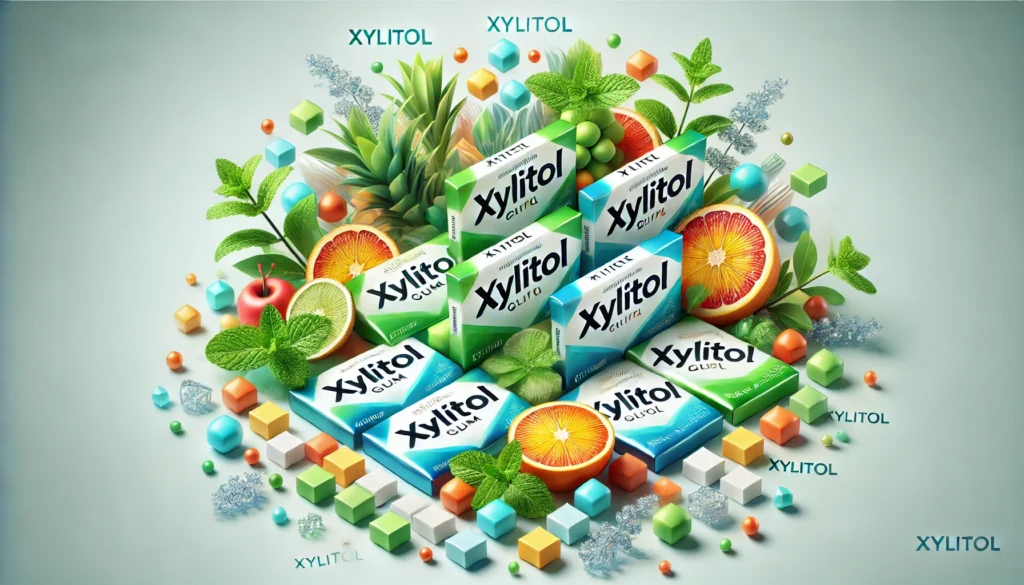
Chewing gum has long been a popular activity for freshening breath and improving oral hygiene. Among the many gum varieties available, xylitol gum stands out for its unique benefits. Derived from natural sources such as plants, fruits, and vegetables, xylitol offers a low-glycemic, sugar-free alternative with numerous health advantages. This comprehensive guide explores the science-backed benefits, proper usage, and potential drawbacks of xylitol gum to help you make informed choices.
Table of Contents
What is Xylitol?
Xylitol is a naturally occurring sugar alcohol with a sweet taste and a cooling aftereffect. Unlike sugar, xylitol does not spike blood sugar levels, making it an ideal alternative for individuals with diabetes or those seeking a healthier sweetener. Widely recognized as safe by the U.S. Food and Drug Administration (FDA), xylitol is frequently used in sugar-free gums, candies, and processed foods.
The Benefits of Chewing Xylitol Gum
1. Promotes Oral Health and Prevents Cavities
Xylitol gum is celebrated for its ability to reduce the risk of tooth decay and cavities. It inhibits the growth of Streptococcus mutans, a bacteria responsible for cavity formation. By neutralizing mouth acids and maintaining an optimal pH level, xylitol gum helps protect tooth enamel and prevents bacterial adhesion.
- Key Insight: Regular chewing of xylitol gum can reduce cavity-causing bacteria and enhance overall oral hygiene.
2. Increases Saliva Production for Dry Mouth Relief
Dry mouth (xerostomia) can lead to discomfort and increased susceptibility to cavities. Xylitol gum stimulates saliva production, which plays a crucial role in washing away food particles, neutralizing acids, and replenishing essential minerals like calcium and phosphate.
- Why It Matters: Saliva supports enamel strength, reduces plaque buildup, and promotes a healthy oral environment.
3. Supports Digestive Health
Chewing xylitol gum has been shown to alleviate symptoms of gastrointestinal reflux disease (GERD) and improve digestion. Enhanced saliva production helps clear acid from the esophagus and aids in swallowing, reducing acid reflux discomfort. Additionally, xylitol gum can promote peristalsis, the muscular contractions that move food through the digestive tract.
- Additional Benefit: Studies indicate that xylitol gum may relieve constipation when chewed regularly.
4. Enhances Focus and Cognitive Function
Chewing gum is linked to increased alertness and improved memory retention. Xylitol gum, in particular, has demonstrated potential in preserving hippocampal function, which is essential for spatial memory and learning.
- Brain Boost: Regular gum-chewing can enhance attention, making it beneficial for work, study, and long-term mental agility.
5. Safe for Diabetics and Weight Management
As a non-glycemic sweetener, xylitol gum does not cause spikes in blood sugar levels. This makes it a safer choice for individuals with diabetes or those seeking to manage their weight while satisfying sweet cravings.
- Diet-Friendly: Sugar-free xylitol gum is an excellent option for maintaining healthy blood sugar and calorie control.
Best Practices for Chewing Xylitol Gum
To maximize the benefits of xylitol gum while avoiding potential drawbacks, follow these guidelines:
- Frequency: Chew xylitol gum three times daily, especially after meals, to combat plaque and bacteria buildup.
- Duration: Avoid chewing gum for more than three hours a day to reduce the risk of jaw strain or temporomandibular joint (TMJ) disorders.
- Choice: Opt for sugar-free varieties to minimize unnecessary sugar intake.
- Precaution: Do not give xylitol gum to children under four years of age to prevent choking hazards.
Potential Side Effects and Considerations
While xylitol gum is generally safe, overconsumption or misuse may lead to minor issues:
- Digestive Discomfort: Excessive chewing can cause bloating or mild laxative effects.
- Jaw Strain: Prolonged gum-chewing may lead to headaches or jaw pain, especially in individuals with preexisting conditions.
- Allergic Reactions: Though rare, some individuals may experience allergies to xylitol.
Special Note for Pet Owners
Xylitol is highly toxic to dogs and can cause severe hypoglycemia or liver damage. Always keep xylitol-containing products out of reach of pets.
How Xylitol Gum Compares to Traditional Gum
| Feature | Xylitol Gum | Traditional Gum |
|---|---|---|
| Cavity Prevention | High | Low |
| Sugar Content | None | Typically high |
| Impact on Blood Sugar | None | Increases |
| Safety for Diabetics | Safe | Not recommended |
| Oral Health Benefits | Strong | Limited |
Conclusion
Xylitol gum offers a wealth of benefits, from improving oral health to enhancing focus and digestion. By incorporating it into your daily routine, you can enjoy a healthier mouth, reduced risk of cavities, and better overall wellness. Remember to chew responsibly, select high-quality sugar-free options, and consult a dentist or healthcare provider for personalized advice.
